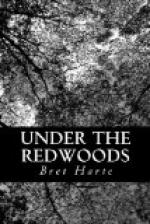“Eay! Then thee aren’t the ’ero sent down from London by the story writer?”
“Not by that one,” said the young man diffidently.
The old man’s face changed. It was no mere figure of speech: it actually was another face that looked down upon the traveler.
“Then mayhap your honor will be bespoken at the Angel’s Inn,” he said, with an entirely distinct and older dialect, “and a finer hostel for a young gentleman of your condition ye’ll not find on this side of Oxford. A fair chamber, looking to the sun; sheets smelling of lavender from Dame Margery’s own store, and, for the matter of that, spread by the fair hands of Maudlin, her daughter—the best favored lass that ever danced under a Maypole. Ha! have at ye there, young sir! Not to speak of the October ale of old Gregory, her father—ay, nor the rare Hollands, that never paid excise duties to the king.”
“I’m afraid,” said the young traveler timidly, “there’s over a century between us. There’s really some mistake.”
“What?” said the groom, “ye are not the young spark who is to marry Mistress Amy at the Hall, yet makes a pother and mess of it all by a duel with Sir Roger de Cadgerly, the wicked baronet, for his over-free discourse with our fair Maudlin this very eve? Ye are not the traveler whose post-chaise is now at the Falcon? Ye are not he that was bespoken by the story writer in London?”
“I don’t think I am,” said the young man apologetically. “Indeed, as I am feeling far from well, I think I’ll get out and walk.”
He got down—the vehicle and driver vanished in the distance. It did not surprise him. “I must collect my thoughts,” he said. He did so. Possibly the collection was not large, for presently he said, with a sigh of relief:—
“I see it all now! My name is Paul Bunker. I am of the young branch of an old Quaker family, rich and respected in the country, and I am on a visit to my ancestral home. But I have lived since a child in America, and am alien to the traditions and customs of the old country, and even of the seat to which my fathers belong. I have brought with me from the far West many peculiarities of speech and thought that may startle my kinsfolk. But I certainly shall not address my uncle as ‘Hoss!’ nor shall I say ‘guess’ oftener than is necessary.”
Much brightened and refreshed by his settled identity, he had time, as he walked briskly along, to notice the scenery, which was certainly varied and conflicting in character, and quite inconsistent with his preconceived notions of an English landscape. On his right, a lake of the brightest cobalt blue stretched before a many-towered and terraced town, which was relieved by a background of luxuriant foliage and emerald-green mountains; on his left arose a rugged mountain, which he was surprised to see was snow-capped, albeit a tunnel was observable midway of its height, and a train just issuing from it. Almost regretting




